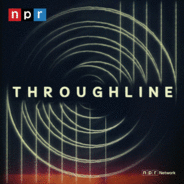
Kultur & Gesellschaft
Throughline Folgen
Throughline is a time machine. Each episode, we travel beyond the headlines to answer the question, "How did we get here?" We use sound and stories to bring history to life and put you into the middle of it. From ancient civilizations to forgotten figures, we take you directly to the moments that shaped our world. Throughline is hosted by Peabody Award-winning journalists Rund Abdelfatah and Ramtin Arablouei.Subscribe to Throughline+. You'll be supporting the history-reframing, perspective-shifting, time-warping stories you can't get enough of - and you'll unlock access bonus episodes and sponsor-free listening. Learn more at plus.npr.org/throughline
Folgen von Throughline
-
Folge vom 25.11.2025What Happened to Vladimir Alexandrov?Rund Abdelfatah and Cristina Kim try to unravel the mystery of a Soviet scientist who was helping to spread the word about nuclear winter theory—until he disappeared. This is a peek at the kind of exclusive bonus content Throughline+ supporters get every month. Want more like this? Sign up via Apple Podcasts or at plus.npr.org/throughline. And thank you!Learn more about sponsor message choices: podcastchoices.com/adchoicesNPR Privacy Policy
-
Folge vom 20.11.2025Democracy Dies in a DayHow quickly can a government fall? Chile was once one of Latin America's oldest democracies, but that all changed in a matter of hours after a military coup on September 11, 1973. Some supported the coup; many did not. But for the next 17 years, all Chileans lived in the grip of brutal authoritarian rule. Today on the show, the story of a democracy’s collapse and rebirth, told through the eyes of four people who lived through it.We’ve got a favor to ask: We know there are a lot of great NPR shows out there.. but we all know who's the best. NPR is celebrating the best podcasts of the year, and YOU get to crown the winner of the People’s Choice Award. Vote for Throughline at npr.org/peopleschoice. May the best pod win!To access bonus episodes and listen to Throughline sponsor-free, subscribe to Throughline+ via Apple Podcasts or at plus.npr.org/throughline.Learn more about sponsor message choices: podcastchoices.com/adchoicesNPR Privacy Policy
-
Folge vom 13.11.2025The Creeping CoupOn the surface, the story of Sudan’s war is about two generals vying for power. But it’s also about a vast web of international interests involving the U.S., China, Russia, and the UAE. Today on the show, the story of how things in Sudan got to this point, and the effects of the conflict around the world. This episode originally ran in 2024 and has been updated.To access bonus episodes and listen to Throughline sponsor-free, subscribe to Throughline+ via Apple Podcasts or at plus.npr.org/throughline.Learn more about sponsor message choices: podcastchoices.com/adchoicesNPR Privacy Policy
-
Folge vom 06.11.2025Winter is ComingLate last month, President Trump announced that the United States would be restarting nuclear weapons tests after a break of over 30 years. We’ve since learned that they won’t be the explosive kind of tests, but this sent us down a rabbit hole — where we found a story about dinosaurs, Carl Sagan, and nuclear war. Because there was a moment in the not-so-distant past when we learned what drove the dinosaurs extinct... and that discovery, made during the Cold War, may have helped save humans from the same fate. This episode originally published in March 2025.Guests:David Sepkoski, Thomas M. Siebel Chair in History of Science at the University of Illinois and author of Catastrophic Thinking: Extinction and the Value of Diversity. Owen Brian Toon, professor of atmospheric and oceanic sciences at the University of Colorado Boulder.Alec Nevala-Lee, novelist, critic, and biographer and author of the forthcoming book Collisions: A Physicist's Journey from Hiroshima to the Death of the Dinosaurs. Ann Druyan, co-writer and co-creator of the television series Cosmos: A Personal Voyage. Andrew Revkin, science and environmental journalist.To access bonus episodes and listen to Throughline sponsor-free, subscribe to Throughline+ via Apple Podcasts or at plus.npr.org/throughline.Learn more about sponsor message choices: podcastchoices.com/adchoicesNPR Privacy Policy
